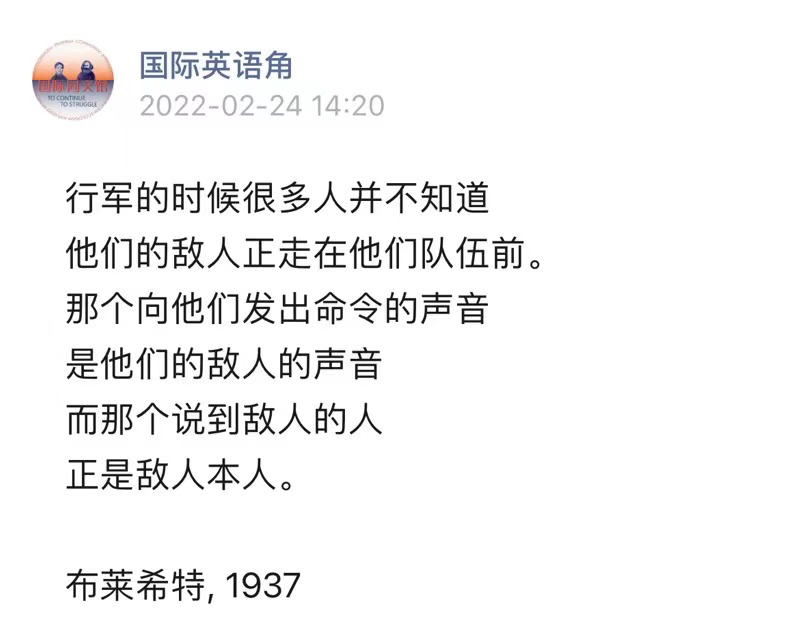
学习和写东西都很懒。但会努力激励自己,大概。
"Deserved" Russia and "Deserved" Ukraine: Geopolitical Intellectual Hegemony
1. Background and purpose of this paper
According to media reports, Russia took military action against Ukraine on February 24. Earlier, the Kremlin had just recognized the independent status of the Donetsk People's Republic and the Luhansk People's Republic in eastern Ukraine. This series of interventions is an extension of the conflict between Russia and Ukraine since 2014. In this regard, Russia claims that NATO's multiple eastward expansion and the deployment of military facilities in its neighboring countries seriously threaten Russia's strategic security. Despite Russia's insistence that it was taking a "special military operation," its deployment of troops into the independent and sovereign state of Ukraine was clearly an imperialist act of invading.
The outcome of this conflict is not yet clear. Some netizens pointed out that the information on the Internet in Jane and China is relatively chaotic, and the information provided by the conflicting parties may serve political purposes. In the current online public opinion, we can see a series of popular discourses: Russia's invasion of Ukraine was a "reluctant" decision; Ukraine's pro-Western government has offended Russia and is self-inflicted; Ukrainian politicians do not recognize their own country. situation and develop the right national strategy, etc. Many domestic media, bloggers, "experts" (even professional university professors), also began to provide relevant opinions. Not only are these arguments the product of particular political positions, they also seem plausible from the usual point of view of international politics.
The task of this article is to "problemize" some of the geopolitical assertions that are taken for granted. Whether it is a "choose side" standpoint, or a "rational" "realistic" analysis, what are the premise of these geopolitical knowledge ? How are they justified, naturalized ? Are these statements and their premises politically sound, even politically neutral? What kind of global order imagination does the so-called "policy conscious" language discipline of small countries reflect?
We do not seek empirical analysis of specific international affairs, but only attempt to provide a perspective on "how to understand international disputes" to critically view the production of popular knowledge about geopolitics . We believe that war (except for its anti-aggression and anti-colonial aspects) is not only an objective humanitarian disaster, but also a collective violence that is artificially planned to serve the interests of socially privileged groups . The existing assumptions and logic of geopolitical knowledge production will still reinforce political inequalities globally, between and within countries.

Two common international conflict discourses
The current popular discourse includes at least two discourses that are not entirely mutually exclusive. The first is anti-war humanitarianism , which holds that people will suffer regardless of the reason, purpose, or outcome of war. This empirical judgment of the consequences of war and sympathy for the people is undoubtedly justified, but it either skips the analysis of war and conflict, and thus may miss insight into the political economy and ideology of war; or it has to Naturalize this situation, such as the ambitions of the political elite, the "objective" needs of the state. Therefore, this naive humanism may be difficult to resist or have to compromise with the second discourse we will explore next.
The second discourse is often used by governments, the media, and ordinary people of different backgrounds. It declares that a great power "has to" take some action in order to protect its own interests, even if such a "forced" response or counterattack will cause casualties and all kinds of unjust results. This discourse is naturalized and justified on two levels:
1) Although the great power is clearly in a strong position in the conflict, it is assumed to be battling a much larger, evil power. Thus, locally it seems to be exercising dominant power over small states, but at another level it is considered a hegemonic resister.
2) The deeper logic is that the power/right of a great power protects its own interests and maintains its power in an anarchist international order, because in the end this will protect the interests of the public in that country.
Based on these two levels of naturalization and legitimacy of intervention or invasion of major powers (political entities with strong comprehensive strength and certain influence over surrounding political entities), a series of "naive" arguments supporting war and criticizing those who oppose war are justified. became reasonable. In fact, they are also often used by great powers to persuade the public and provide moral justifications/excuses for acts of war. Article 2, to some extent, more deeply reflects the political philosophy and cultural imagination of the "modern" nation-state system, that is, citizens form a political community called the "state" through the transfer of rights and the conclusion of a social contract, so that the state represents the country ( not foreign) citizens.
3. Why do you say this is imperialism?
The two justifications together form the basis of an "imperialist ideology" (and its rhetoric). How does it serve imperialism?
1) The hegemony of "counter-hegemony" and its rhetoric
Although the major powers claim to take "necessary" (military) actions to protect the interests of the people and even to resist foreign oppression, those countries and people who are also violated are only used as tools, deprived of "speak" and autonomous action space and qualifications . This kind of political legitimacy to resist foreign oppressive forces and protect the security of the country is only established within the scope of a country (refer to Article 2 above). Therefore, the so-called dual view of "revolting against hegemony" excludes the multiple and multi-level hegemony or power relations between countries in real situations, and only "looks up" to focus on the so-called "right to exist" and "security" of great powers.
Another problem with it is that "security" itself is not only substantive but also rhetorical. In the context of the dissemination of political/moral legitimacy discourses, it is not easy to know what the limits of this legitimacy are. If hegemonism based on "anti-hegemony" has direct rationality, it means that in a "multi-poly" international political order, any country with local and regional hegemony will easily obtain intervention through this The legitimacy of the internal affairs of neighboring countries .
Some may question (based on the political assumption of Article 2 above) that great powers are inherently responsible only for their own people, and that security risks may also be real in a jungle-like international order, so we need to further point out , the imagining of the state (interest and representation) is itself problematic.
2) The political significance of the state as a unit of analysis
The state is used as a basic unit of geopolitical analysis. The conventional vision of geopolitics is this: an anarchist jungle society, where each nation decides and acts as a holistic actor. This is not only a reflection of the concept of "state" as a social and political system, but also a cultural construction and imaginary way of national representation. In other words, the behavior of the state is like the behavior of individuals; the interests of the state are the embodiment of the interests of the people, and for the society and people within the country, it is the embodiment of the politically neutral "general will".
This imagines the state as a monolithic, internally politically neutral institutional entity and actor . However, the country includes different social forces and social groups with different interests, and its claimed (within a country) universal political rights/citizenship does not reflect the actual social dimensions such as class, gender, race/ethnicity, etc. The distribution of benefits and the degree of equality cannot cover up the actual separation between subordinate groups and upper-level ruling elites. In fact, although political science advocates that the state has a certain degree of institutional autonomy and provides the possibility for negotiation of different interests, its basic context is still that national interests are often distorted by ruling elites to serve their own interest groups . For imperialism, it is to serve the transnational interests of its ruling bloc.
Here, the so-called "deserving" theory of small countries is nothing more than acknowledging the right of big countries (imperialists) to interfere with the freedom and autonomy of other countries, and to persuade these weak countries and their people to accept their subordinate status. This discourse further rationalizes the current oppressive global order of imperialist polygamy, and also deprives weak countries and nations of the legitimacy and possibility of resistance (this does not mean that all actions of the Ukrainian authorities are equated with such resistance). ), in essence allied with various colonialisms and imperialisms.
Moreover, this geopolitical mass knowledge production is also shaped by applied, pragmatic-first relevant expertise. Geopolitics and international relations studies in the contemporary mainstream academic system share the above state (behavior/interest) assumptions to a considerable extent. Although academic research does not ignore the influence of non-state actors, this is only because they—such as political elites, the public—are the influencers of policy and political change. Powerful forces such as nation-states are placed at the center of the analysis, not only because these institutions have a strong influence, but also because mainstream knowledge production relies mainly on universities, think tanks, and they receive funding from states, international organizations, and multinational corporations. and serve it . At the same time, this knowledge also influences public perceptions potentially or intentionally through mass media, strengthening the ideological bond between the people and the state. The production of expertise, then, needs to be "useful" to these institutions and the powerful groups that control them, not accountable to the people.
Four How is the anti-imperialist argument possible?
It has been discussed above how the ideology of imperialism presents the interests, policies, and wills of the state (primarily in the service of its ruling group and directly manipulated by a small elite of Universal appeal and purpose. In conclusion, in order to create an anti-imperialist discourse space, we need to pay attention to two key dimensions of imperialism:
1) International level: The political and economic dynamics of imperialist decision-making itself transcend national borders. On the one hand, it is based on the current global system of nation-states, and on the other hand, the negotiation process of national decision-making itself is also influenced by the network of geographical interests (centered on imperialism).
2) Domestic level: Imperialism claims that its foreign intervention is for the basic interests of its people, but this generalized and naturalized "super-class" national interest is itself a myth. It often benefits the ruling bloc that profited from the imperialist system and the political elites it supports, at the expense of the majority of socially subordinate groups, and even sends civilians into battle by coercion or patriotism.
There are never just two options for attitudes toward war. We do not have to be content with sticking to a plain anti-war stance, but also question and reject so-called "rational" and "realistic" political discourses that justify war. We have theoretically demonstrated the mythical nature of the latter, its ideological role as the basis and product of various forms of statism (militarism, imperialism) . The development of an anti-war, anti-imperialist, for the people and for the people geopolitical discourse is possible only by cleaning up and reflecting on the existing geopolitical discourse, and the political tendencies that presuppose that discourse.
To be clear, I am not against the requisite geopolitical and international relations perspective as an analytical tool, but it should be applied on the basis of reflection on its assumptions to avoid alienating national interests and agendas from the category of analysis to Analysis purpose. In addition, imperialist intervention means not only military intervention, but also economic sanctions. The conflicts that imperialism participates in may not only be due to its autonomous ambitions, but also its competition, cooperation, and compromise with other imperialists are worthy of attention. But as already stated above, this does not mean opening the door to any kind of imperialism.

Past comments:
Nora in Chains: A Narrative of Eight-Child Women in Xuzhou and Rural Patriarchy (2022-2-22)
Orientalism, Multiple "Edges" and Aesthetic Liberation: A Review of the Chen Man Incident and Its Controversies (2021-12-22)
Welcome to subscribe to Matters account and WeChat public account " Mayfly Ghost "
ID: gh_ff416309254e

Like my work?
Don't forget to support or like, so I know you are with me..
Comment…